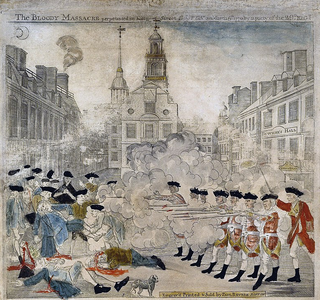Guilt
Is Impartiality Possible? A 250-Year Retrospective
The Boston Massacre trial offers inspiration to today's defenders of fairness.
Posted December 17, 2020
At a time when questions are being raised about the impartiality of the judiciary, the 250th anniversary of the conclusion of the Boston Massacre trials is especially notable. The courage of one man, John Adams, did more than perhaps any other to establish a tradition of American judicial fairness.
The son of a humble Massachusetts farmer, Adams would go on to help write the Declaration of Independence, negotiate the peace treaty with Britain, author the world’s oldest functioning written constitution (Massachusetts), and serve as the first vice president and second president of the United States. But it was when practicing law near Boston at age 35 that Adams took perhaps his bravest stand, in defense of British soldiers.
Colonial opposition to British rule was running high after the 1760s Stamp Act and Townshend Act, which led to charges of “taxation without representation.” To enforce such laws, the British parliament sent troops to cities such as Boston, where 2,000 soldiers were stationed. From time to time, scuffles would erupt between troops and the town’s inhabitants, some of which swelled into riots.
One such confrontation took place the night of March 5, 1770, when a group of men confronted a British private guarding the Custom House, insulting him and hurling snowballs. When a small relief force of seven was called, they too were pelted with projectiles.

Spoiling for a fight, the crowd dared the troops to fire their weapons, and after one soldier was struck in the head, they did. Five civilians were killed, including Crispus Attucks, a black man often called the first person killed in the American revolutionary war.
After order was restored, the British soldiers were arrested on charges of murder. Efforts to secure legal counsel for their defense were unsuccessful, largely because any attorney accepting the case would be risking his reputation, his livelihood, and perhaps his family’s safety, so high were sentiments against the British occupiers. Adams had his own reasons to decline. The fee was trifling, his daughter had just died, and his wife Abigail was pregnant.
Yet to the surprise of many, Adams agreed to take the case, arguing that “Counsel ought to be the very last thing an accused person should want in a free country. The bar must be independent and impartial at all times and in every circumstance.”
Adams recognized that the case represented an opportunity to establish the impartiality of judicial process, ensuring that even immensely unpopular defendants serving a reviled cause could receive a fair trial. Wrote Adams, “If I can but be the instrument of preserving one man’s life, his blessing and tears of transport shall be a sufficient consolation to me, for the contempt of all mankind.”
Late in 1770, two trials took place, the latter concluding in December. The defendant in the first was Captain Thomas Preston, accused of having ordered his soldiers to fire on the crowd. It became the first criminal trial in Massachusetts to last more than one day.
Adams called 22 witnesses, striving to help those in attendance visualize the chaotic scene and convince the jury that no definitive proof had been offered that Preston gave the order to fire. A key factor in the second trial’s outcome was Adams’ masterful decision to introduce testimony of one of the men who had been mortally injured, who stated on his deathbed that the soldiers had fired in self-defense.
Adams’ words at the trial have continued to ring down through history. Arguing that political passions should play no part in a court of law, Adams urged the jury to focus on facts. “Facts are stubborn things; and whatever may be our wishes, our inclinations, or the dictates of our passion, they cannot alter the state of facts and evidence.”
While many resentful colonists would have rejoiced in a conviction, Adams held that the exoneration of the innocent should be the top priority in any proceeding: “It is more important that innocence be protected than it is that guilt shall be punished, for guilt and crimes are so frequent in this world that they cannot all be punished.”
Despite such noble sentiments, Adams found the trial itself a terrible ordeal, later writing, “Never was I in more misery in my entire life.” Yet he knew he was laboring on behalf of a higher and perhaps even sacred cause. At stake was the impartiality of the judiciary and a broader principle, the fairness of government itself. Thanks to Adams, Preston and five of the men were acquitted, and the other two were branded on the hand.
If the law were not applied fairly to all people, then citizens would have no reason to hope for justice: “If innocence itself is brought to the bar and condemned, perhaps to die, then the citizen will say, ‘Whether I do good or whether I do evil is immaterial, for innocence itself is no protection,' and if such an idea as that were to take hold in the mind of the citizen, that would be the end of all security whatsoever.” Such stories offer deep inspiration to defenders of fairness today.


